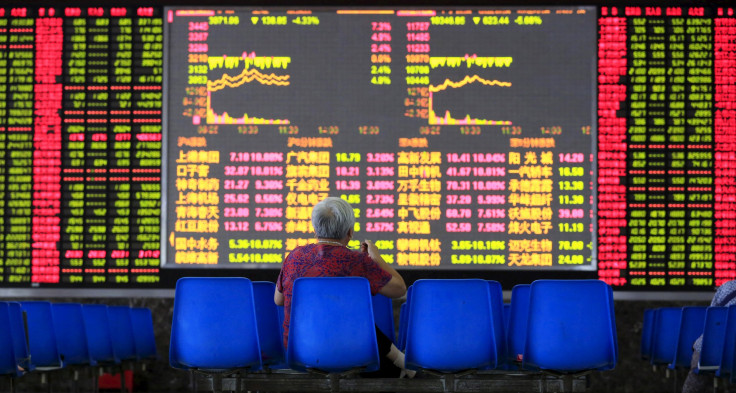Deputy Head Of China’s Stock Market Regulator Investigated For 'Severe Violations'

SHANGHAI -- The Chinese government’s attempts to rein in recent turmoil in the country’s equity markets has taken a dramatic new twist, with the detention of the deputy head of the official stock-market regulator. Zhang Yujun, assistant chairman of the China Securities Regulatory Commission (CSRC), is being investigated for “severe disciplinary violations” -- a phrase typically used to imply corruption -- according to the official Xinhua News Agency.
China’s equity markets have been a focus of both domestic and international concern in recent months, after rising 150 percent in the year to mid-June, before plunging more than 30 percent in July and forcing the government to spend huge sums propping up the stock markets in an effort to prevent a complete collapse in investor confidence. The authorities -- who many outside observers have blamed for talking up the market in the first place -- have said since July that abnormal trading, insider dealing and other illegal behaviors were the cause of much of the volatility. They have detained a number of staff members at Citic Securities Co. Ltd., China’s biggest brokerage, as well as a journalist with the leading financial magazine Caijing who was accused of causing instability by reporting that the government was planning to stop shoring up the markets.
Ordinary citizens have also been punished, and websites closed, for spreading market-related rumors. Meanwhile, a comparatively junior staff member at the CSRC was detained late last month, accused of insider trading and taking bribes to help companies list their shares on the stock market. However, the investigation of Zhang takes the crackdown to a new level.
Zhang, 52, is a veteran Chinese stock-market insider. He first joined the regulatory body in the early days of China’s markets two decades ago. He later served as president of both of China’s main stock exchanges, in Shanghai and Shenzhen, before becoming assistant chairman of the CSRC in 2012.
No details have yet been given about Zhang’s alleged violations, but analysts say the move is a further sign that the authorities are anxious both to rein in market volatility -- estimated to have wiped out more than $3 trillion of the value of Chinese shares in the past two months -- and to emphasize that manipulation, rather than the fundamental overvaluation of the markets, has been one of the major causes of the recent instability.
Before this slump, officials had repeatedly emphasized that China’s stock markets would play an important role in allocating funds for the country’s economic development in the coming years, one of the reasons why tens of millions of new retail investors poured into the markets in 2015. And with China now facing slowing growth in its exports and gross domestic product, the authorities are all the more keen for the markets to stabilize.
News of the probe of Zhang, who has a doctorate in economics and law, came a day after the authorities announced that the president of Citic Securities, Cheng Boming, had also been put under investigation. Citic played a major role in promoting cross-border equity swaps, enabling foreign hedge funds to invest in China’s market and avoid normal government restrictions on such trading, as the Wall Street Journal reported this week.
And some Chinese media commentaries and reports have accused foreign speculators of partial responsiblity for the market volatility, although other analysts have suggested that the authorities should look closer to home for the cause of the problems, as even the website of the official People’s Daily newspaper was predicting a long-term bull run in the Chinese markets, just two months before the crash began. The CSRC itself is also seen by some observers as having contributed to the markets’ unsustainable boom, through lax controls on margin trading, which permitted ordinary citizens to use shares as collateral to borrow money from brokerages to buy more stocks.
And with questions raised about the government’s intervention measures -- and relative lack of public communication -- since the slump began in June, the authorities are clearly keen to show they are taking decisive action. Police have raided brokerages and in some cases told traders not to sell more shares, the New York Times said last week, while censors are also reported to have ordered Chinese media to downplay negative coverage of the markets.
However, some analysts say recent events constitute a sign that more reform of China’s markets is needed. The country’s authorities have traditionally given preferential treatment to state-owned companies, making it easier for them to gain listing than enterprises in the nation’s more-dynamic private sector. And many Chinese firms do not offer dividends to shareholders, which experts say increases the likelihood of investors selling their shares as soon as their value appreciably rises.
The CSRC said last week it would soon take steps to address some of these issues, while also introducing a circuit-breaker mechanism to prevent excessive daily swings in the markets.
Nonetheless, the Chinese stock markets remain volatile: After climbing last week, the main Shanghai Stock Exchange Composite Index fell some 5 percent in the first two days of this week, although it regained 4.9 percent Wednesday -- before the news of Zhang’s detention was reported.
© Copyright IBTimes 2025. All rights reserved.






















